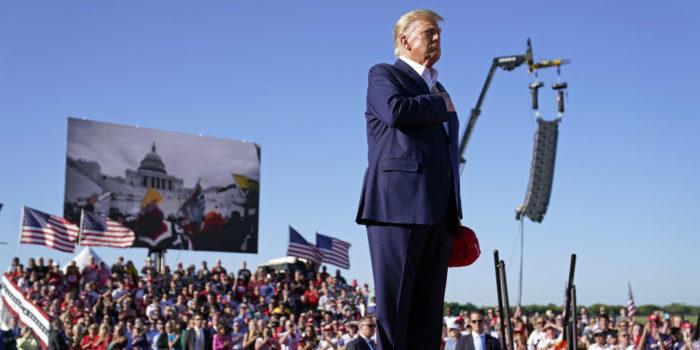(Robert Jonathan, Headline USA) Former President Donald Trump could avail himself of some significant legal self-help if he gets the keys to the Oval Office in 2024 according to an influential constitutional scholar.
Prof. Jonathan Turley claimed that the former-POTUS could pardon himself if the latter is convicted in the pending federal case in connection with the alleged mishandling of national defense documents.
A self-pardon in that case or any other one brought against a former president would be unprecedented, but obviously so is a criminal, political indictment of a former president.
Generally very measured in his legal analysis, Turley asserted that “Presidents can issue-self pardons,” even though he is not supportive of a commander-in-chief using that kind of escape clause.
The George Washington University law professor and self-described liberal explained that “While I do not agree with self-pardons, I do not see any constitutional barrier to the use of such presidential power.”
Turley also rejected the premise that Trump would have to temporarily turn the presidency over to his vice president under the 25th amendment and allow the VP, rather than himself, to issue the theoretical pardon.
He went on to explain that “Article II, Section 2, of the Constitution defines the pardon power as allowing a president to ‘grant reprieves and pardons for offenses against the United States, except in cases of impeachment.’ There is no language specifying who may or may not be the subject of a pardon. The president is simply given the power to pardon any federal crime.”
Turley also opined that a 1974 U.S. Department of Justice memo deeming self-pardons unconstitutional “was dead wrong.”
A pardon could be issued even if federal charges are still pending as reportedly established by an 1866 U.S. Supreme Court case ironically called Ex parte Garland.
Harvard Law School professor Mark Tushnet told CBS news that “The arguments about whether a president can pardon himself are not only unsettled in the sense that they haven’t come up before, but they’re also unsettled in the sense that reasonable lawyers could look at the materials and say either result is legally defensible.”
Jeffrey Crouch, a professor at American University, who is said to an expert on the president pardon power, told the same news organization that “The big unanswered question is whether the president might be able to pardon himself. No president has ever tried it, so we don’t know what the result would be if it was attempted.”
While it would be uncharted legal territory, if it ever happened, it would provide additional hours of anti-Trump content for MSNBC and CNN.
The constitutional controversy, if it ever arises, likely would wind up in the lap of the Supreme Court.
Those on the right have accused Democrats weaponizing the legal system against their political opponents in a process often called lawfare.
A president’s constitutional pardon authority does not apply to any state-level charges, such as the Trump indictment in New York City for a bookkeeping error, if that, or potential charges in Georgia for alleged election meddling.
A Harvard Harris poll released last week indicated that “If Trump is convicted, 53% of voters –- driven by 80% of Republicans –- support pardoning him in the interest of national unity.”
Should he win the White House, GOP presidential candidate Vivek Ramaswamy has already pledged to pardon Trump in the documents case.

